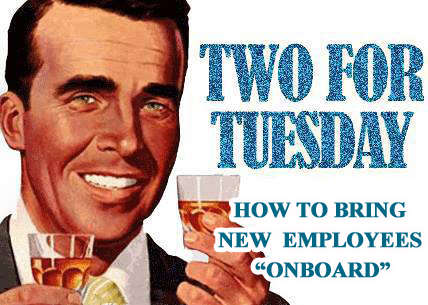
If you’ve ever been on a blind date or met somebody over the internet only to find out when you got together face to face that the person wasn’t quite who or what you were expecting then you know how bad things can go in a hurry. It’s the same when you hire a new employee for your smoke shop. The person fills out an application and comes in on the first day of the job, but the fit is like trying to force a square peg in a round hole. The only person you have to blame is yourself for missing an important part of the hiring process — the transitional phase between the job offer and the person becoming a full-fledged employee. It’s called onboarding, and simply put, it’s about integrating a new employee into the business and its culture.
Many businesses consider an employee’s first day as the start of onboarding, but the truth is that onboarding begins the moment you tell them they’re hired. The first day on the job is when you start training on how to work the register, spot a fake ID and what to do while closing or opening for a shift — onboarding give you the opportunity to acquaint your new employee with the behind the scenes of your business — its history, mission statement, expectations, etc.
Being clear about the responsibilities of the job and the company culture from the beginning of the onboarding process helps minimize the risk that your new hire might leave because the reality of their role doesn’t match up to what they were expecting — it’s no coincidence that as much as 20% of employees quit their job within the first week.
Millennials, in particular, need and want to know exactly how you want them to perform. Providing a clear introduction and overview of their job will go a long way. Provide dos and don’ts when it comes to communication, leadership, work hours, etc. Being proactive with providing this information puts everyone on the same page and gets that first day off to a positive start.
Telling a new hire that they can start “tomorrow” is a big mistake. They may be enthusiastic, but they’ll be coming in blind. According to a recent study, 86% of buyers are willing to pay more for great customer experience, and while there are many components of customer experience, few are more important than product knowledge training. To empower your new hires to deliver an exceptional customer experience, educate them on your products.
One of the easiest ways for employees to learn about products or services is by using them — we’re not suggesting handing them a pipe and telling them to smoke up, but rather paying for them to come into the shop, get the lay of the land, check out the merchandise and ask questions.
The internet is a great teacher when it comes to learning about products. Nearly 50% of consumers look to Amazon to educate them on product features — your new hire can use the same online resources. Well before their first day on the job, email them a list of links to your vendors websites and any Youtube videos that show the products being “unboxed.” They don’t need to be experts, but they should be able to answer basic questions about product features and benefits.
Its easy to see why business that implement onboarding programs experience 50% greater new hire productivity than those without. Slow speed to full productivity is one of the biggest reasons why turnover is so expensive. Effective onboarding gives new hires the tools they need to succeed on their own, meaning they need less hand-holding and are better at what they do right from the start.












